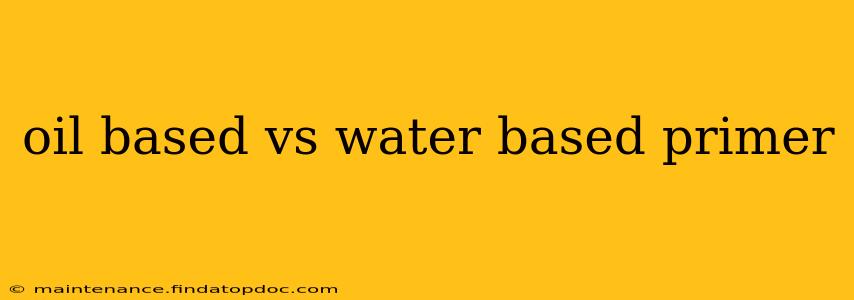Choosing the right primer can significantly impact the final look and longevity of your paint job. Two dominant types exist: oil-based and water-based primers. Understanding their differences is crucial for achieving professional-looking results. This guide will delve into the key distinctions between oil-based and water-based primers, helping you make an informed decision for your next project.
What are the Key Differences Between Oil-Based and Water-Based Primers?
The fundamental difference lies in their base solvent: oil-based primers use mineral spirits or solvents, while water-based primers, as the name suggests, utilize water. This seemingly simple distinction leads to a cascade of other differences in their properties, application, and suitability for various projects.
Drying Time:
-
Oil-Based: Oil-based primers take significantly longer to dry, often requiring several hours or even overnight before applying the topcoat. This extended drying time can be a drawback for those working on time-sensitive projects.
-
Water-Based: Water-based primers dry much faster, usually within a few hours, allowing for quicker project completion. This speed is a significant advantage for many DIYers and professionals alike.
Clean-up:
-
Oil-Based: Cleaning brushes and equipment used with oil-based primers requires mineral spirits or solvents, which are more hazardous and require careful disposal.
-
Water-Based: Water-based primers are easily cleaned up with soap and water, making them a more environmentally friendly and convenient option.
Durability and Adhesion:
-
Oil-Based: Oil-based primers offer excellent adhesion and durability, particularly on surfaces like metal and wood. They create a strong barrier against moisture and provide a longer-lasting finish. They are also known for their excellent stain-blocking capabilities.
-
Water-Based: Water-based primers offer good adhesion and durability, but might not be as strong as oil-based options on all surfaces. Advances in water-based primer technology have significantly improved their performance and durability, though.
VOCs (Volatile Organic Compounds):
-
Oil-Based: Oil-based primers typically have higher VOC content, contributing to stronger odors and potential air quality concerns.
-
Water-Based: Water-based primers are significantly lower in VOCs, making them a healthier choice for both the applicator and the environment. This is a crucial consideration for indoor projects.
Which Primer is Best for Which Surface?
The best primer choice often depends on the surface you're preparing:
-
Wood: Both oil and water-based primers work well on wood, but oil-based primers offer superior stain-blocking properties and are often preferred for exterior projects due to their superior moisture resistance. Knots in the wood, especially, benefit from the sealing properties of oil-based primers.
-
Metal: Oil-based primers provide excellent rust prevention and adhesion to metal surfaces, making them a popular choice for metal projects.
-
Plaster and Drywall: Water-based primers are generally preferred for plaster and drywall due to their ease of application and faster drying times. Their low-VOC content is also a significant advantage for indoor environments.
-
Previously Painted Surfaces: Both work, but the choice often depends on the existing paint (oil-based paint typically requires an oil-based primer). Water-based primers are generally more versatile for repainting projects.
What is the Difference in Cost Between Oil-Based and Water-Based Primers?
Generally speaking, oil-based primers tend to be slightly more expensive than water-based primers. However, this difference is often offset by the faster drying time and easier cleanup associated with water-based options.
How Do I Choose the Right Primer for My Project?
Consider these factors when selecting a primer:
- Surface type: Wood, metal, plaster, previously painted surfaces.
- Indoor or outdoor use: Exterior projects might benefit from the durability of oil-based primers.
- Drying time: Faster drying time is beneficial for time-sensitive projects.
- VOC content: Lower VOC options are better for indoor environments and health concerns.
- Budget: Weigh the cost against the overall project time and convenience.
By carefully considering these factors, you can choose the best primer for your specific needs and ensure a successful paint job.
Are oil-based primers better than water-based primers?
There's no single "better" primer; the optimal choice depends entirely on the specific project requirements. Oil-based primers excel in durability, stain blocking, and adhesion on certain surfaces, while water-based primers offer faster drying, easier cleanup, and lower VOCs, making them ideal for other applications.
Are water-based primers as good as oil-based primers?
Modern water-based primers have significantly improved in quality and performance. While oil-based primers still hold an edge in some areas like stain-blocking and durability on certain surfaces, water-based options are now a viable and often preferred alternative for many projects, especially considering their environmental and health benefits.
